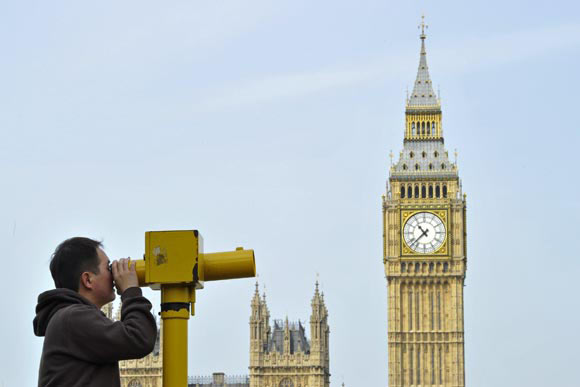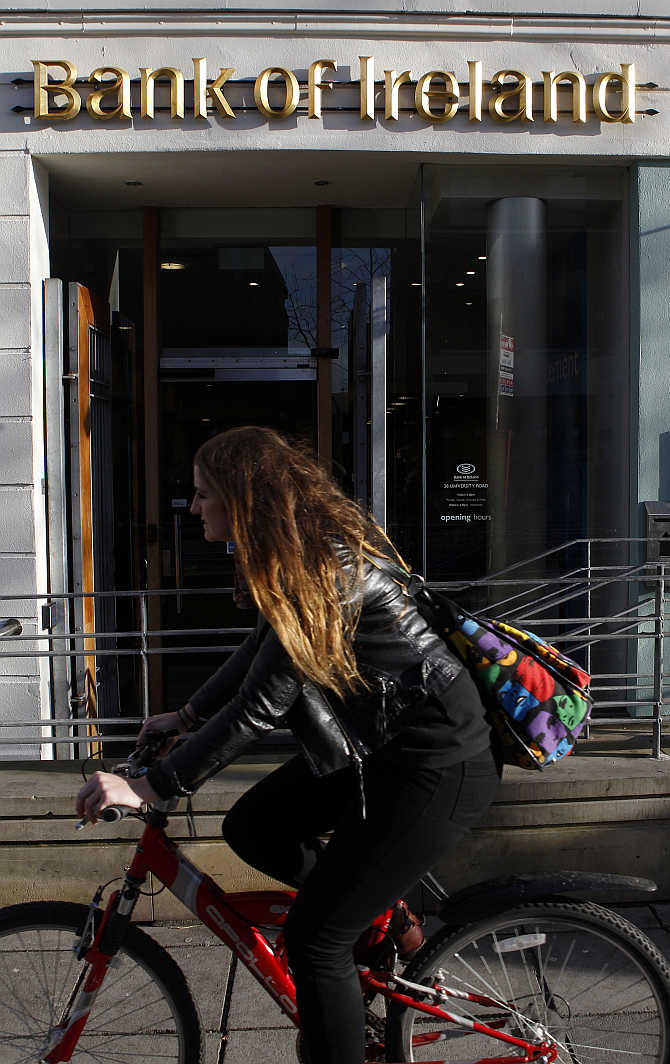Photographs: Reuters Sudipta Mishra
It won't be tough to find a job in these student-friendly destinations.
As the economic climate makes study abroad more expensive for Indian students, any work that will add a little extra to their pockets without hampering their studies is helpful.
Find out what it means to find work in these countries as an international student.
Singapore
International students are not allowed to work during the academic term or vacations unless granted Work Pass exemption under the Employment of Foreign Manpower (Work Pass Exemptions) Notification.
Requirement of work pass is waived for certain schools if students are above the age of 14 and are on vacation.
Please click NEXT to continue reading...
The UK
Photographs: Toby Melville/Reuters
International students enrolled for a Bachelor's degree or above are allowed to work for up to 20 hours per week during term time and full-time during vacations.
For students pursuing an education programme below the Bachelor's level, the permitted work hours are up to 10 hours per week during term time.
Please click NEXT to continue reading...
France
Photographs: Pascal Lauener/Reuters
International students have the right to work while studying as long as they are enrolled in an institution that participates in the national student healthcare plan.
Students who are not nationals of EU member countries need to hold a valid residency permit.
French laws allow students to work 964 hours in a year.
Please click NEXT to continue reading...
Germany
Photographs: Dado Ruvic/Reuters
International students in Germany belong to a country outside the EU or EEA are allowed to work 120 full or 240 half days in a year. They do not need authorisation from the Employment Agency, the German authorities.
However, if students want to work more than 120 full or 240 half days they need the approval of the Employment Agency and the Aliens Department.
International students from outside the EU are also not allowed to be self employed or freelance.
But if the occupation is of academic nature or of a student assistant, work can be carried out for an unlimited period of time.
Please click NEXT to continue reading...
Ireland
Photographs: Cathal McNaughton/Reuters
International students from outside the EEA who are pursuing a full-time course of at least one year's duration leading to a qualification recognised by the Minister for Education and Science are entitled to take up casual employment.
Casual employment is defined as up to 20 hours part-time work per week or full-time work during normal college vacation periods.
Please click NEXT to continue reading...
Italy
Photographs: Alessandro Garofalo/Reuters.
If an international student has a visa for study reasons and needs to stay in Italy for more than 90 days, s/he must request a residence permit.
Any international student with a residence permit is allowed to have a part-time job like Italian citizens, working no more than 20 hours a week.
Please click NEXT to continue reading...
Switzerland
Photographs: Reuters
International students hailing from non-EU/EFTA countries studying in Switzerland are permitted to accept part-time employment for a maximum of 15 hours per week, but only after residing in Switzerland for a minimum of six months.
Students must maintain full-time student status and show regular progress in their studies.
However, Master's students with a Bachelor's degree from a university abroad working for their Swiss university/institute do not have to wait for six months.
Please click NEXT to continue reading...
The US
Photographs: Romeo Ranoco/Reuters
International students in the USA (F1 visa holders) are not allowed to do off-campus jobs in the first year of their studies, unless specially permitted by the Designated School Official.
Under certain circumstances, the US Citizenship and Immigration Services (USCIS) may grant permission to students to work off-campus after a year of study.
But they can work on-campus without permission from USCIS for up to 20 hours a week during regular sessions and 40 hours a week during extended holidays, breaks and summer sessions.
Please click NEXT to continue reading...
Australia
Photographs: Tim Wimborne/Reuters
International students in Australia are permitted to work a maximum of 40 hours per fortnight during academic sessions, and unlimited hours during breaks and vacations.
However, there are no restrictions for postgraduate research students, students working for a philanthropic voluntary unpaid work or work is a registered part of the course.
Please click NEXT to continue reading...
Canada
Photographs: Courtesy Careers360
International students studying at a public university, a community college, a college d'enseignement general et professionnel (CEGEP), a publicly-funded trade or technical school or a private institution authorised to confer degrees are permitted to work on the campus of the institution they are attending without a work permit.
They can work for the institution itself, or for a private business located on the campus.
Through the Off-Campus Work Permit Programme, international students can work part-time during regular academic sessions for 20 hours a week and full-time during scheduled breaks, such as winter and summer holidays, and spring break.
Please click NEXT to continue reading...
New Zealand
Photographs: Dennis Owen/Reuters
International students in New Zealand may be granted a 'Variation of Conditions' to their Student Permit to allow them to work for up to 20 hours in any given week during the academic year and during any holidays within the academic year without an offer of employment if they are:
- undertaking a full-time course of study at a Private Training Establishment or Tertiary Institution, of at least 2 academic years duration; or
- undertaking a full-time, full secondary school year course of study in Years 12 or 13 and have written permission from their school and written parental consent; or
- engaged in full-time course of study of at least 6 months duration at a Private Training Establishment or Tertiary Institution, and a visa or immigration officer is satisfied that the primary purpose of a course of study is to develop English language skills, and you have an IELTS overall band score of 5.0 or above.
Students who have a Student Permit may be granted a Variation of Conditions to allow them to work during the Christmas and New Year holidays at the end of each academic year, if they are undertaking a full-time course of study of 12 months' or more duration.
In such cases, an offer of employment is not required.












Comment
article